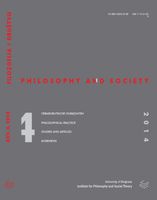Well-being, Capabilities and Philosophical Practice
Well-being, Capabilities and Philosophical Practice
Author(s): Aleksandra BulatovićSubject(s): Philosophy
Published by: Institut za filozofiju i društvenu teoriju
Keywords: Well-being; quality of life; concept; capabilities; experience; philosophical practice
Summary/Abstract: The concept of well being has become the main criterion to assess quality of life in contemporary society. Individual well-being describes the individual quality of life, while social well-being refers to quality of life in a society. Given that well-being has a multitude of dimensions, a unique definition of it is elusive to scholars. In this article social well-being is conceptualised as a dynamic process within the context set by social integration as one's relationship to society and the community. This includes the quality of interaction between the individual and society and one's 'social actualisation' understood as the realisattion of one's social capacities. Social actualisation also involves one's ability to influence social processes and to benefit from social cohesion, which consists, in any society, of the quality, organisation and functioning of the social world. Hence the ability to impact society is an integral part of individual well being. This paper suggests that philosophical practice as a new paradigm in the humanities holds out promise for the improvement of both individual and social well-being.
Journal: Filozofija i društvo
- Issue Year: 25/2014
- Issue No: 4
- Page Range: 105-120
- Page Count: 16
- Language: English

